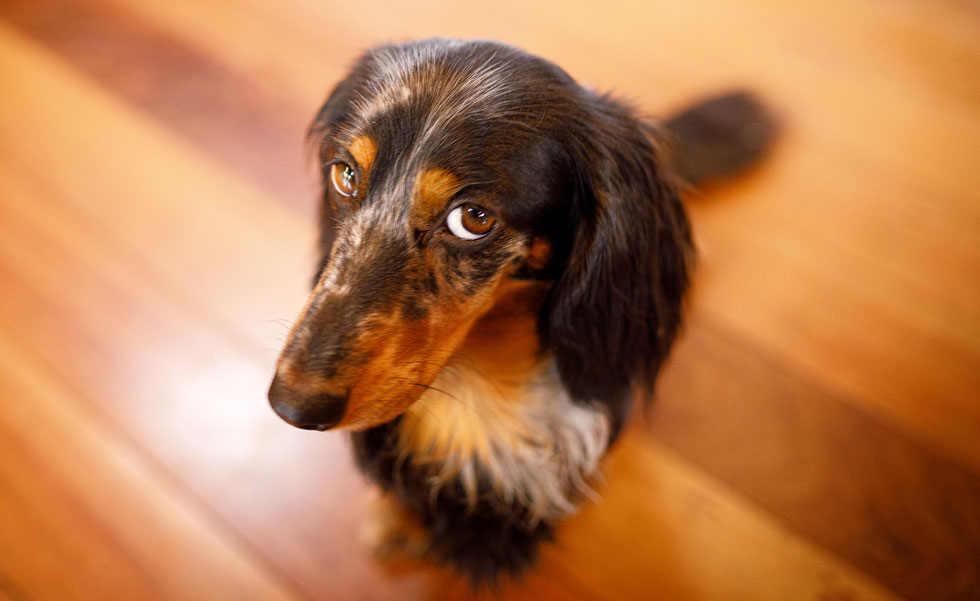My Dog Ate a Penny - What Do I Do?

Swallowing a penny can easily be a life-threatening emergency for your dog.
The first and most immediate threat is choking. Since a coin is round like the airway, it can easily become lodged and obstruct breathing. If you think your dog is choking—acting panicked, pawing at the face or throat, and not making much noise—it is a dire emergency. Check out this article for first aid tips: "First Aid for Coughing and Choking in Dogs."
The next dangerous part of a swallowed penny for a dog is if it becomes lodged in the stomach or intestines, causing a physical obstruction. This results in vomiting or dry-retching, lethargy, not eating, and it can cause death. This condition often requires surgery to resolve.
The last life-threatening condition a swallowed penny can cause is zinc poisoning.
Zinc Poisoning in Dogs
Pennies used to be made mostly of copper, but in 1982, the US began producing pennies made primarily of zinc.
If your dog swallows a penny made after 1982, stomach acids will begin breaking down the coin, releasing zinc into the bloodstream, where it can cause zinc poisoning.
Zinc poisoning is a serious condition that destroys a dog's red blood cells. From there, it can cause liver damage, kidney and heart failure, and pancreatitis.
Signs of Zinc Poisoning in Dogs
Signs of zinc poisoning include:
- Weakness/collapse
- Pale or yellow gums
- Rapid breathing
- Rapid heart rate
- Dark brown to red urine
- Decreased or absent appetite
- Vomiting
- Diarrhea
- Lethargy
Initially, the GI symptoms of vomiting and diarrhea, along with decreased appetite and lethargy occur. As the condition progresses and enough red blood cells are destroyed to result in anemia and then organ failure, gum and urine color changes and increased respiratory and heart rates occur, leading to weakness and collapse.
Treatment of Canine Zinc Poisoning from Pennies
Surgery may be required to remove the coins if they can't be removed using endoscopy.
Treatment for dehydration and electrolyte imbalances will likely begin before surgery and continue afterward. Anti-nausea medications may be required. Other care to support the liver, kidneys, and heart may be necessary. A blood transfusion may be called for if the anemia is bad enough. Chelation therapy to bind absorbed zinc may be needed.
Prognosis for this condition varies depending on the number of coins ingested and the size of the dog as well as how long the coins were eaten before treatment began.
If you see your dog ingest a penny, it's crucial that you get them to the veterinarian as soon as possible, even if you aren't seeing any symptoms yet.
Other Causes of Zinc Poisoning in Dogs
There are other ways dogs can develop zinc poisoning besides ingesting pennies.
- Getting into human vitamins and other supplements
- Eating human cold lozenges
- Ingesting human zinc oxide creams (some sunscreens and some diaper rash creams)
- Eating some acne medications
- Ingesting galvanized steel nuts and bolts
- Eating tacks
- Chewing on/ingesting zippers
- Eating batteries
- Ingesting certain game board pieces or dice
- Eating BBs
- Ingesting some jewelry
- Swallowing some auto parts
If your dog gets into anything you believe may contain zinc, call your veterinarian immediately or call the Pet Poison Helpline at 1-800-213-6680.
Never give your dog any supplements containing zinc without your veterinarian's input.
Disclaimer: This website is not intended to replace professional consultation, diagnosis, or treatment by a licensed veterinarian. If you require any veterinary related advice, contact your veterinarian promptly. Information at DogHealth.com is exclusively of a general reference nature. Do not disregard veterinary advice or delay treatment as a result of accessing information at this site. Just Answer is an external service not affiliated with DogHealth.com.
Notice: Ask-a-Vet is an affiliated service for those who wish to speak with a veterinary professional about their pet's specific condition. Initially, a bot will ask questions to determine the general nature of your concern. Then, you will be transferred to a human. There is a charge for the service if you choose to connect to a veterinarian. Ask-a-Vet is not manned by the staff or owners of DogHealth.com, and the advice given should not delay or replace a visit to your veterinarian.


